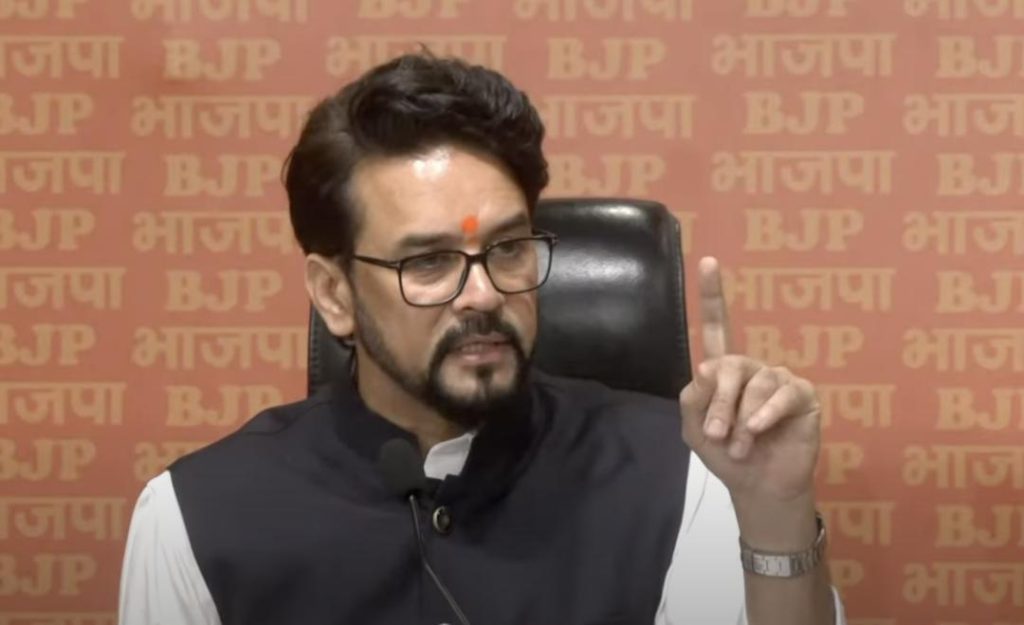
Congress & CPI made Bhimrao Ambedkar lose the poll in 1952: BJP
Bhimrao Ambedkar, the father of the Indian Constitution and a leading Dalit leader, was defeated in the 1952 elections, a fact that is often overlooked in the annals of Indian political history. In a recent statement, BJP MP Anurag Thakur shed light on this little-known aspect of India’s political past, claiming that the Congress and the Communist Party of India (CPI) together conspired to defeat Ambedkar in the very first election of independent India.
Thakur made these remarks while addressing a gathering in Himachal Pradesh, where he highlighted the electoral corruption that was prevalent even in the early days of Indian democracy. He pointed out that 74,333 votes were rejected in the 1952 elections, which was a staggering number considering the total number of votes cast. This, he claimed, was a deliberate attempt by the Congress and CPI to rig the election and eliminate Ambedkar from the political scene.
Ambedkar, who was a key figure in the drafting of the Indian Constitution, was a strong advocate for the rights of Dalits and other marginalized communities. He was also a vocal critic of the Congress party, which he believed was not doing enough to address the socio-economic inequalities faced by Dalits and other backward castes.
Thakur’s remarks have sparked a heated debate in political circles, with many questioning the validity of his claims. While it is true that Ambedkar lost the election, it is not clear whether the Congress and CPI were directly involved in his defeat. However, what is undeniable is that the 1952 elections were marred by widespread electoral corruption and irregularities, which undermined the very fabric of Indian democracy.
The 1952 elections were the first in independent India, and they were marked by a sense of excitement and hope among the electorate. The Congress party, which had played a key role in the Quit India movement and the struggle for independence, was the dominant force in national politics at the time. The CPI, on the other hand, was a relatively new party that had gained popularity among the working class and rural populations.
Ambedkar, who was a member of the Indian National Congress, had broken away from the party in 1951 to form the Scheduled Castes Federation (SCF). He had done so in protest of the Congress party’s attempts to marginalize Dalits and other backward castes. Ambedkar’s decision to form a new party was seen as a bold move, as it was the first time a prominent Dalit leader had challenged the dominant position of the Congress party.
The 1952 elections were marked by a series of irregularities, including voter suppression, booth capturing, and rigging. The Congress party, which had the backing of the government, was accused of using its resources and influence to manipulate the outcome of the election. The CPI, on the other hand, was seen as a more radical force that was willing to challenge the status quo and fight for the rights of the working class and rural populations.
Ambedkar’s defeat in the 1952 elections was a significant setback for the Dalit movement, which was already facing challenges from within. His party, the SCF, failed to win even a single seat in the Lok Sabha, and Ambedkar himself lost his seat in the Bombay Legislative Assembly.
In the years that followed, Ambedkar’s health began to decline, and he passed away in 1956. His death was a huge loss for the Dalit movement, which was left without a strong leader to guide it. However, his legacy continued to inspire a new generation of Dalit leaders, who went on to play a key role in the Indian political landscape.
In conclusion, the 1952 elections were a significant turning point in Indian political history, as they marked the beginning of a new era of electoral politics in the country. While the exact nature of Ambedkar’s defeat is still a matter of debate, it is clear that the Congress and CPI were involved in a series of irregularities that undermined the integrity of the election process. As Thakur pointed out, the rejection of 74,333 votes was a staggering number that highlights the scale of electoral corruption that was prevalent at the time.
The legacy of Ambedkar continues to inspire a new generation of Dalit leaders, who are working to address the socio-economic inequalities faced by Dalits and other marginalized communities. As we reflect on the significance of Ambedkar’s defeat in the 1952 elections, we are reminded of the importance of upholding the integrity of the election process and ensuring that every vote counts.
Source:https://youtu.be/0kLyW5rSJSg






